A Conversation With Kathy Hogan Trochek
by Claire E. White
Atlanta novelist Kathy Hogan Trocheck is the author of eight mysteries, including the highly acclaimed Callahan Garrity and Truman Kicklighter series.
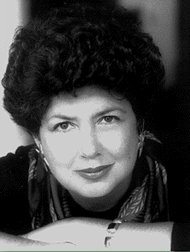
|
Married and the mother of two young children, Trocheck lives in a circa 1926 Craftsman bungalow in an Atlanta suburb, where she is happily ensconced in a new backyard "writing shrine" constructed for her by her husband from a hut salvaged from Atlanta's 1996 Olympics, and which was featured in Better Homes and Gardens this past summer. The delightful sense of humor that shows through in her books extends into the promotional end of the writing business; she has been known to show up for booksignings in a costume appropriate to the book. Kathy talked with us about how she made the transition from award-winning journalist to successful novelist, how she created her popular Callahan Garrity series, and shares her insights on how beginning writers can improve their skills.
How did you get your start as a journalist? What types of stories did you cover?
I got a degree in newspaper journalism from The University of Georgia.
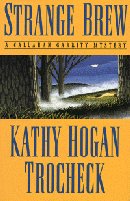
|
What influenced you to leave journalism to become a full-time novelist?
By 1990 USA Today was in full swing and newspaper journalism had changed. My paper's management had changed too. I found that the kind of celebrity-based journalism I was doing didn't satisfy me. My stories didn't matter to me. And I wanted to be able to work at home, to spend more time with my husband and kids.
Do you find writing fiction to be more satisfying than writing nonfiction? Why or why not?
I love writing fiction--most of the time. I make most of my own rules, and generally, the scope of my work is only limited by me. No office politics, no meetings, no pantyhose, no commute. What a joy!
Do you ever miss the life of a journalist?
I do sometimes miss the collegial aspect of a newsroom, and the immediate gratification one gets from daily journalism. I also miss that delicious sense of being an insider.
In 1990, we were introduced to Callahan Garrity, an ex-cop and current private investigator and owner of an Atlanta-based cleaning service. How did you create the character of Callahan?
I'd started thinking about writing a mystery. I wanted to write 1st person, about a feisty, Southern private eye. Callahan insisted she be the one.
How has Callahan developed from the first book to her latest, seventh adventure?
| "I think any time you write about family, it can be so painful the only way to deal with it is with honesty and humor." |
I'd like to talk about your new book starring Callahan Garrity, Midnight Clear. What was your inspiration for the story?
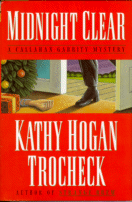
|
The story takes on some really serious issues such as parenting (or lack of it) and abusive relationships. How did you approach writing about these issues and integrating them into an entertaining mystery at the same time?
I wrote about those issues from Callahan's point of view. She has an offbeat, sometimes dark sense of humor, so that's the sensibility she brings to the story. I think any time you write about family, it can be so painful the only way to deal with it is with honesty and humor.
I'd like to talk about your other mystery series which stars Truman Kicklighter, retiree extraordinaire. What made you choose South Florida as a setting for this series?
I'm a native of St. Petersburg, Fla., where the Truman books are set, and my parents still live there. At one time, my mother ran a restaurant in a residential hotel much like The Fountain of Youth, where Truman lives. I'd always wanted to write about my hometown and that setting.
When will we see Truman again?
I don't currently have a contract for another Truman, but I hope to revive the series sometime soon.
Tell us about your special writing space - I understand it was featured in Better Homes and Gardens this past summer?
 My office is a 10-by-10 foot shed that was recycled from the
1996 Olympics. It had been used as a display space by the
representatives of a Polish Olympics Bid Team, and I bought
it for salvage. My husband had it dismantled and moved to my
backyard, where we rebuilt it,installing floors, walls, windows,
a door, insulation, electricity, even heat and air. It's tiny, but
I love it.
My office is a 10-by-10 foot shed that was recycled from the
1996 Olympics. It had been used as a display space by the
representatives of a Polish Olympics Bid Team, and I bought
it for salvage. My husband had it dismantled and moved to my
backyard, where we rebuilt it,installing floors, walls, windows,
a door, insulation, electricity, even heat and air. It's tiny, but
I love it.
Do you have any special rituals or routines that you use when you write?
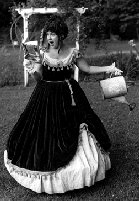 I like to have the sun on me when I write, and a
Diet Coke close at hand. I have a writing shrine near my
computer, and sometimes I light candles and place fresh flowers
at the feet of my own special patron saint. If I'm really
getting close to deadline time, I'll run away from home,
renting a hotel room or staying at the mountain home
of friends, away from the distractions of kids and ringing phones.
I like to have the sun on me when I write, and a
Diet Coke close at hand. I have a writing shrine near my
computer, and sometimes I light candles and place fresh flowers
at the feet of my own special patron saint. If I'm really
getting close to deadline time, I'll run away from home,
renting a hotel room or staying at the mountain home
of friends, away from the distractions of kids and ringing phones.
What do you love most about being a novelist?
I love the sense of possibility. I love creating characters and giving them a stage to perform upon. Writing dialogue brings them to life. I could write dialogue all day.
What do you like to read?
I read a lot of mystery. Dick Francis, Sue Grafton, Marcia Muller, Margaret Maron, James Lee Burke, Tony Hillerman, Julie Smith, Michael Connelly. I read some non-fiction, especially anything to do with Southern history. And I'm a member of a woman's book club. We read House of Mirth last month. This month we're reading Under The Tuscan Sun.
Do you ever face writer's block? How do you overcome it?
I get stuck on plot points. I fidget, take a walk, whine, cry, get a Diet Coke, light my writing candles, talk to mystery writer friends, then get back to work. I don't have time for real Writer's Block.
As a writing teacher, what is the biggest mistake that you see nonfiction writers make?
Sometimes non-fiction writers overlook what the central theme of their story should be. They assume the reader knows more than they do. They forget to entertain.
I know you recently taught a class at the Atlanta Journal-Constitution's AJC Univeristy. What are some of the elements of fiction that nonfiction writers can use in their writing?
Non-fiction writers can take more care letting readers know
| "[R]ead the kind of works you'd like to write. Do your homework. Learn the rules of criminal evidence, of criminal detection. Find your fictional voice. It must be fresh, original, with an absoluteness that lets an agent or editor know that you know what you're writing about." |
What is your advice to novice journalists trying to break into the business?
Novice journalists trying to break into fiction, or non-fiction? Doesn't really matter. Whoever you are, write. Keep writing. Be critical of your work. Read the work of the masters. I used to love to read the Style section of The Washington Post when I was a features writer. Take care to bring some style to your writing. Challenge authority. Ask questions.
What is your advice to aspiring mystery novelists?
Aspiring mystery writers? Again, read the kind of works you'd like to write. Do your homework. Learn the rules of criminal evidence, of criminal detection. Find your fictional voice. It must be fresh, original, with an absoluteness that lets an agent or editor know that you know what you're writing about.
How much do you use the Internet? How do you think it has affected the book publishing world?
I'm just getting comfortable using the Internet. I love the immediacy of it. If I have a question, I can just go online, and find an expert. Don't really know yet how it will affect book publishing world. I myself don't think I'll see the day when I'll prefer sitting at a computer to read a book as opposed to propping myself up in bed or on a sofa to read.
Midnight Clear takes place over the Christmas holidays. What is the most memorable Christmas you've ever had?
The most memorable Christmas was probably the first year we were married. We'd moved to Savannah a month earlier, had no money and were away from our families for the first time in our lives, in our first tiny apartment. We hung Christmas cookies on the tree, strung popcorn, had dinner with strangers. It was wonderful.
What's on your Christmas wish list for this year?
Christmas list? I'd like a new computer and a new printer and fax. I'd like a weekend in New York with my husband and kids, like the trip we took last January. Tickets to a Broadway musical. A bestseller. Some bubblebath. A long nap.
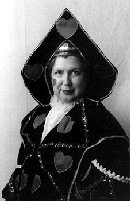 What projects are you working on now?
What projects are you working on now?
Oh projects. What a list. I'm finishing up a short story for a mystery anthology called Murder They Wrote. I'm working on a one-shot mystery set in Savannah. I'm working on a humorous novel about love, divorce and chicken salad. I'm trying to write a screenplay of Crash Course, my second Truman Kicklighter mystery. I'm teaching a high school writing workshop next week. I'm never bored!
Return to the November 1998 issue of The IWJ.
More from Writers Write
